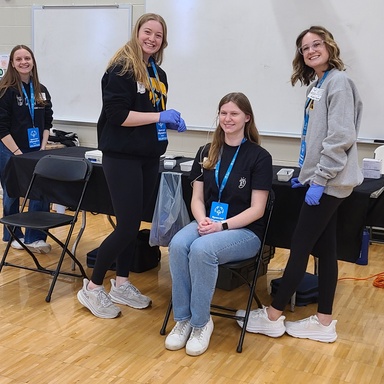By Will Bower
Students and faculty from the Department of Communication Sciences and Disorders in the College of Liberal Arts and Sciences provided hearing screenings at the Special Olympics Spring Classic at West High School in Iowa City on Mar. 15, 2025. The screenings were provided as part of the Special Olympics Healthy Hearing initiative, offered in conjunction with Healthy Athletes.
According to the Special Olympics Healthy Athletes webpage, people with intellectual disabilities often receive “sub-standard care or virtually no health care at all.” Healthy Athletes aims to provide cost-free health screenings for athletes with intellectual disabilities.

Clinical assistant professor Jacqueline Carder and research audiologist Elizabeth Stangl serve as clinical directors for Special Olympics Iowa Healthy Hearing. Carder said they work to recruit volunteer professionals and students in the field of communication sciences and disorders to provide the screenings.
“Our goal is to detect possible ear and hearing problems, recommend medical and audiologic follow-up, promote hearing protection and regular hearing screenings,” Carder said.
Carder said hearing loss can exaggerate the effects of an intellectual disability, which can cause a breakdown in communication.
“We hope that when we detect hearing loss or excessive wax, the experience with our screening team will create a positive association with hearing healthcare for the athlete and that they will follow-up on our recommendations,” Carder said.
Katie Pribyl, an Au.D. graduate student and volunteer, said while hearing loss can affect anyone, it is especially prevalent in individuals with disorders like Down syndrome that result in anatomical differences within the ear.
“As a clinician, it is important to get hands-on experience with the populations you will be serving,” Pribyl said. “Taking part in this event allows me to grow my skills in interacting with this population, while also helping serve my greater community.”
Pribyl added that the event was an opportunity to build direct relationships with both patients and their families.
“Audiology is a very patient centered field and a lot of the work you do is simply talking to and educating your patient on what healthy hearing looks like for them,” Pribyl said.
Katelyn Darbyshire, another Au. D. graduate student and volunteer, said the event allowed her to apply the skills she has learned this year.
“Throughout the day, I was able to perform otoscopy, tympanometry, OAEs, and pure tone audiometry screenings for our athletes,” Darbyshire said. “I loved engaging with our Special Olympic athletes and learning how they did in their events.”
Carder and Stangl are actively recruiting new volunteers, particularly in other parts of Iowa. If you are interested in getting involved, contact them at elizabeth-stangl@uiowa.edu or jacqueline-carder@uiowa.edu.